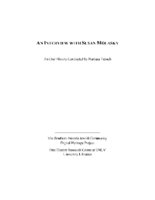Search the Special Collections and Archives Portal
Search Results
Audio recording clip of interview with Mary Louise Williams by Claytee D. White, June 19, 1998
Date
Archival Collection
Description
Part of an interview with Mary Louise Williams conducted by Claytee D. White on June 19, 1998. Williams recalls working as a showgirl at the Moulin Rouge and traces her subsequent careers as a social worker and school teacher.
Sound

Transcript of interview with Jean Tobman, Marilyn Moran and Janie Moore by Claytee D. White, November 5, 2013
Date
Archival Collection
Description
Interview with Jean Tobman and two of her daughters, Marilyn (Tobman) Moran and Janie (Tobman) Moore by Claytee White, November 5, 2013. In this interview, Jean Tobman recalls coming to Las Vegas with her husband and two young children in the 1950s, and the life they established in the Pinto area of the Westside. Her husband, Herb, owned City Furniture and a cab company near downtown. Marilyn and Janie discuss their youth and the enjoyable time they had growing up in Las Vegas. Marilyn talks about how the city has grown and her time on the planning commission. Janie also discusses the growth of Las Vegas and her nostalgia for old Las Vegas.
In 1953, Jean and Herb Tobman moved from New Jersey to Las Vegas. The Tombans settled in the Pinto Palamino. Upon moving, Jean initially assisted her mother at her rooming house, and Herb worked with Jean's father at City Furniture. Herb bought his first cab soon thereafter, and grew one vehicle into Western Cab Company, which is still family-run. After a large fire closed City Furniture, Herb worked as the general manager at Moulin Rouge, jumpstarting his career in the gaming industry. Marilyn, Janie and Helen are the children of Jean and Herb and all still live in Las Vegas. The girls grew up keeping horses, as did many other neighbors in the Pinto area. Marilyn married John Moran, the sheriff's son, who served as a police officer himself. She sat on the planning commission for a decade, during the city's growth spurt. Janie spent a semester at Arizona State University before returning to Las Vegas to work at Stardust Hotel, a property co-owned by her father, who also served as the its president.
Text
Wilner, Linda C.
Linda Wilner was born July 15, 1944 in New York. She moved to Las Vegas, Nevada in 1970 to be closer to her family after divorcing her first husband, leaving her a single mother of two children. She met her husband, Martin at a Jewish Singles event. They were married on December 22, 1974 and adopted a son, Robert. She was a real estate agent in one of the most robust housing markets in the country at the time.
Person

Transcript of interview with Charles Salton by George Green, April 23, 1976
Date
Archival Collection
Description
Interview with Charles Salton by George Green on April 23, 1976. Salton discusses arriving in Las Vegas in 1929, after his family had moved from New Jersey to Huntington Beach, California. His father sold real estate, and expected a boom after the authorization for the construction of Hoover Dam. His father was involved in bootlegging and then owned Al's Bar, a drinking and gambling establishment, on the alley at South First Street. Salton describes the area around Fremont Street and Las Vegas Boulevard with businesses and grocery stores, the grammar school and high school, and the hospital. Salton talks about his social activities, including involvement in the Jewish Community Center (Temple Beth Sholom), and several of the bars, clubs and casinos in the area. He briefly discusses the mob influence in the casinos versus corporate ownership and then speaks about the education system in Clark County.
Text

Paul Sogan interview, May 16, 1995: transcript
Date
Archival Collection
Description
Interviewer: Dennis McBride
Text

Paul M. Lytle interview, March 8, 1995 transcript
Date
Archival Collection
Description
Lytle discusses his birth in Salt Lake City, Utah, his early life in Overton, Nevada, moving around the Southwest United States, and returning to Overton in the early 1930s to work with the Civilian Conservation Corps. Subjects Lytle also talks about in the interview include road and campsite construction at the Valley of Fire State Park, stories about associates and relatives, and being enlisted as a male nurse with the United States Army during World War II. Lastly, Lytle talks about the construction of an exhibit building at Hoover Dam (Boulder Dam) originally used as a headquarters for soldiers during World War II to protect the dam.
Text
Eckert, Donald L., 1953-
Donald L. Eckert was born on June 22, 1953 in Las Vegas, Nevada. He was an assistant food director at the Barbary Coast Hotel in Las Vegas, Nevada.
Person

Meeting minutes for Consolidated Student Senate University of Nevada, Las Vegas, April 1, 1992
Date
Archival Collection
Description
Text
Greenberg, Gene
In 1976, Gene Greenberg decided to accept a job transfer with Donrey Media Group and relocated from Laredo, Texas to Las Vegas. Las Vegas was comfortable fit and for the next 30 years, he primarily worked in television ad sales. He rose to become executive vice president and general manager of KVBC-TV.
Significant to Gene’s ties to Las Vegas have been his ties to the Jewish community including his active involvement with Young Leadership, Jewish Federation, and Temple Beth Sholom.
Person

